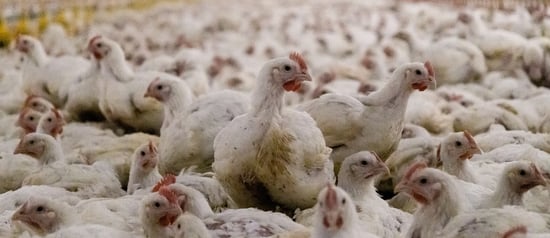
COP30 is the 30th annual United Nations climate conference. It brings together almost every country on Earth to discuss the prevention of climate change.
This year’s COP, which stands for ‘Conference of the Parties, is held in Belém, Brazil.
It also marks the 10th anniversary of the Paris Agreement, which is a treaty adopted in 2015 that set the goal of limiting global temperature rise to 1.5°C. Despite years of promises and little action, the planet is still heating at an alarming rate. One of the biggest culprits is factory farming.
Why COP30 is different
COP30 offers governments the opportunity to finally act on food system transformation. Agriculture is responsible for around a third of all global greenhouse gas emissions with factory farming being one of the biggest drivers of deforestation, biodiversity loss, and pollution.
This COP must put food, farming, and animal welfare at the heart of climate action.
The real face of factory farming
Every year, 76 billion animals are confined in crowded, barren facilities for cheap meat, eggs, and dairy. This system fuels extreme cruelty and environmental destruction on a global scale.
Forests and the wildlife within are destroyed to grow crops like soy for animal feed, land that could instead grow food for people or restore wildlife habitats. The huge volumes of emissions do not only come from farmed animals but also from the fertilisers used, the transport, and the feed production that sustain them.
Factory-farmed meat is not the solution. It is dirty, destructive, horrendously cruel and relies on an outdated system that cannot stay.
A just transition to higher-welfare and more sustainable farming
Ending factory farming isn’t just about reducing its impact on the planet. It’s also about creating a higher-welfare and more sustainable food system in favour of animals and people, too.
A just transition means supporting farmers to move away from factory-style systems and embrace nature-friendly farming. It means shifting away from practices that cause immense suffering for animals and harm the planet.
Governments must redirect public subsidies away from harmful factory farming and towards a more sustainable food production system.
Why animal welfare belongs on the climate agenda
Animal welfare and environmental sustainability are connected. When animals are treated as commodities rather than living beings, it drives overproduction, waste, and ecosystem collapse.
At COP30, governments must acknowledge that you can’t tackle the climate crisis without tackling animal cruelty. Ending factory farming would cut emissions, reduce deforestation, and create a fairer food system for all.
What we’re calling for at COP30
Governments need to:
- Phase out intensive animal farming and invest in humane, sustainable food systems.
- Withdraw harmful subsidies that fuel deforestation and factory farming.
- Support farmers through a just transition that benefits people, animals, and the planet.
- Put animal welfare at the centre of food system transformation.
Factory farms have no place in the future
The choices made at COP30 will shape our planet’s future. World leaders can either keep funding a broken, cruel food system or choose a future where animals are treated with compassion, nature thrives, and people have access to healthy, sustainable food.
Call for an end to cruel factory farming
Sign our petition to the UK government and let them know that there is no future for factory farming.
